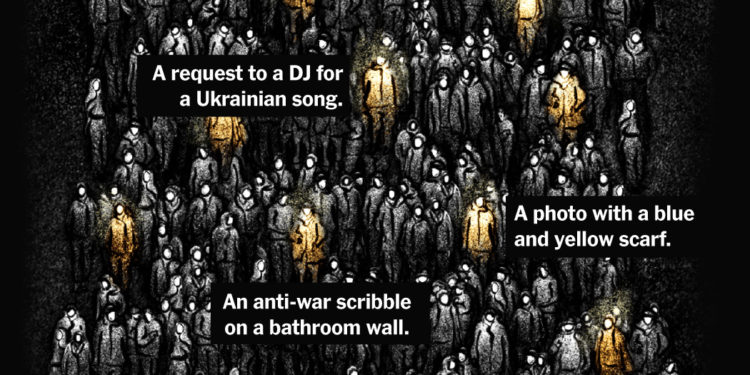By THE NEW YORK TIMES
Just days after invading Ukraine, President Vladimir V. Putin of Russia signed a censorship law that made it illegal to “discredit” the army. The legislation was so sweeping that even his spokesman acknowledged it was easy to cross the line into prohibited speech. In the first 18 months of the war, the law scooped up a vast array of ordinary Russians — schoolteachers, pensioners, groundskeepers, a carwash owner — for punishment.
The law has led to more than 6,500 cases of people being arrested or fined, more than 350 a month on average, according to a New York Times analysis of Russian court records through last August. That’s a small percentage of Russia’s population of 146 million, but The Times analyzed the details of every case, revealing the extraordinary reach and invasiveness of the Kremlin’s crackdown; anyone questioning the war or revealing sympathy with Ukraine — even in a private conversation — is now liable to prosecution in Russia.
No gesture, apparently, is too small. Judges have ruled that simply wearing blue and yellow clothing — the colors of the Ukrainian flag — or painting one’s fingernails blue and yellow can be punished. And there are few safe havens as people increasingly inform on their fellow citizens. In dozens of cases, people were prosecuted after someone reported them for comments they made on the train, in a cafe or in a liquor store.
The censorship law has enabled Mr. Putin to perpetuate a nearly two-year invasion that has killed or maimed hundreds of thousands of Russians and Ukrainians, with minimal resistance from those at home who oppose it. While most Russians tell pollsters they support the war, close to 20 percent say they don’t.
In the past, the government would make examples of a few individuals, some prominent; now it is practicing widespread censorship. This year, with antiwar speech in public largely eliminated, the records show that authorities remained intent on stamping out criticism expressed online and in private. More than 3,000 cases involved social media or messaging platforms popular in Russia.
“A large number of totally unknown, nameless, nonpublic people, who simply wrote something or said something somewhere, are getting hit,” said Andrei Kolesnikov, a senior fellow at the Carnegie Russia Eurasia Center.
To better understand the extent of this censorship, we spent months analyzing a database of every available public record of prosecutions under the new law provided by OVD-Info, a Russian human rights and legal aid group.
First-time offenders are typically handed a fine of 30,000 rubles — around $300 at the current exchange rate, about half the average monthly salary in Russia — while repeat offenders can receive prison time. Known as article 20.3.3, the law has become the most widely used tool in Russia’s wartime crackdown, and it is the focus of our analysis; another law punishes spreading “false information” about the Russian army with up to 15 years in prison.
Experts say the wartime censorship is transforming Russian society and setting the stage for even more widespread repression in the future, as the authorities automate their monitoring of the internet and encourage people to denounce each other online. Mr. Putin set the tone last year when he referred to opponents of the war as “scum and traitors” to be cleansed from society.
In response to the crackdown, many Russians have begun to self-censor. Demyan Bespokoyev, a private school tutor who was prosecuted for writing an antiwar message on his coat, described the process this way: “The prison forms inside your head.”
Silencing Protest
In the first months of the war, the documents show, Russia was focused on stamping out dissent in public spaces.
Russia’s crackdowns on free speech used to garner global headlines. Now they are noticed less and less. One reason is the sheer scale: On each of the 530 days of the war for which we have near-complete data, an average of 13 cases were heard in court involving people opposing the war — and that’s just under the discreditation law. The indignities of the crackdown, and the long arm of the Russia law, is being lost in the numbers.
In villages and far-flung regions, in schools and hospitals, in chat groups and local news outlets, and in a prison and on a military base, people were accused of speaking out against the war.
The analysis challenges the notion that opposition sentiment in Russia is concentrated among the elite in Moscow, St. Petersburg and other major cities. The documents show that two-thirds of the cases were heard in courts located in cities and towns with a population of less than a million.
In the small town of Iglino in western Russia, a retired train driver named Zaynulla Gadzhiyev, now 76, predicted on his social media page: “Nothing will save Russia now from collapse.”
Mr. Bespokoyev, 22, the private school tutor, walked through a St. Petersburg subway station wearing the overcoat his grandfather wore in World War II, on which Mr. Bespokoyev had written: “I’m hurting and afraid. I don’t want war.”
In Novosibirsk in Siberia, Marina Tsurmast, a local journalist, scrawled “Bucha” in red on a piece of paper and pasted it over an exhibition stand celebrating the anniversary of Russia’s annexation of Crimea. Police officers detained her on the spot.
Marina Tsurmast at her flat in Novosibirsk, Russia.
Nanna Heitmann for The New York Times
In dry legalese, the court documents recount the Russian state’s case against these statements and protests.
The judge in the case of Ms. Tsurmast, the journalist, ruled that she had “distorted the true goals” of Mr. Putin’s war. A St. Petersburg judge ruled that Mr. Bespokoyev, the tutor, had undermined “the authority, image and trust in the use of the Armed Forces of the Russian Federation.” And Mr. Gadzhiyev, the retired train driver, was cited for “undermining trust in the decisions of the state authorities of the Russian Federation on the conduct of the special military operation.”
All three were fined 30,000 rubles, about $500 at the time. In those first three months of the war, the data shows that at least 1,662 other Russians faced prosecution for antiwar speech.
Other critics, some of them prominent opposition figures, have received much harsher sentences under other more punitive laws, like the politician Vladimir Kara-Murza, who received a 25-year term on treason charges after criticizing the war. A pacifist artist, Aleksandra Y. Skochilenko, 33, was sentenced in November to seven years in a penal colony for placing price tags with small antiwar messages in a supermarket.
But for the thousands convicted of discrediting the army, the fines are a small part of the trouble they face. Interviews with 10 of them show that convictions bring social opprobrium and complications in finding work, spurring some people to leave Russia altogether.
The law has seeped into the fabric of Russia’s society, adding to the dread of anyone opposing the war. Ms. Tsurmast, the journalist in Novosibirsk, says her anxiety level rises when she notices car headlights outside her apartment window or hears a sound at a late hour.
“I had these attacks of paranoia,” she said in a phone interview, adding that she still felt it sometimes. “The elevator at night — is it coming for me?”
Reaching Into Private Life
The number of cases grew amid the outcry over Mr. Putin’s draft in September 2022. The crackdown reached increasingly into people’s personal lives.
On the morning of Sept. 25, 2022, police officers burst into the Moscow apartment of Daria Ivanova, 29, and, she said, carried her out by her arms and legs before she had time to put on her shoes. Surveillance cameras had identified her and a friend, the police told her, as being the ones who put up prank posters to protest Mr. Putin’s mobilization: “To order a coffin, go to the nearest draft office.”
Ms. Ivanova says she was beaten while in custody for 11 hours. Still in Moscow, she now takes a dim view of her job prospects. A friend told her that, given her conviction, “you’ll never be approved by the security service” at the state company where the friend worked.
Daria Ivanova in the elevator of her building in Moscow.
Nanna Heitmann for The New York Times
The episode highlights the Kremlin’s reach in trying to catch the war’s opponents: It has deployed the police, electronic surveillance and fellow citizens against them.
In smaller towns, the residents do the surveillance themselves. Anton Redikultsev, now 48, was an art teacher in the town of Kalga near the Chinese border — population: 2,545. This past June, a deputy district prosecutor filed charges against him, citing as evidence five social media posts, including links to antiwar songs and a picture of a child’s drawing with the words: “No need for bombs!” He was fined 30,000 rubles. On Sept. 1, the first day of school, he was fired.
Mr. Redikultsev, who is also a competitive powerlifter and goes by the nickname “Lifter,” said the conviction had turned him into an outcast. People who always greeted him on the street now turn away, he said. “People like to overstate, make up details and exaggerate.”
But Mr. Redikultsev insists he has no regrets. Keeping quiet, he said, “seems comparable to a sort of dishonor — to silent agreement.” In court, he said, he asked the prosecutor how he was supposed to exercise his right to express his opinion, which the Russian Constitution technically still guarantees.
“He didn’t respond,” Mr. Redikultsev recalled.
Policing the Internet
By this year, with public protest all but gone because of the crackdown, the internet was left as the main vehicle for dissent.
In June, Russia’s Constitutional Court upheld the censorship law in the face of a challenge from OVD-Info, the legal aid group. People’s “negative assessment” of the Russian military could adversely affect its performance, the court said, presenting a national security risk. But the court left it up to individual judges to decide what exactly qualified as illegal speech — a remarkable acknowledgment of the law’s arbitrariness that the Kremlin has embraced.
Asked in a November interview to explain the difference between justified criticism of the war and “discreditation,” Dmitri S. Peskov, Mr. Putin’s spokesman, said it was hard to determine. “Where’s the line? I can’t tell you,” he said. “It’s very thin.”
In Moscow courtrooms, the cases have become routine. Last month, a prosecutor in a navy blue uniform quietly read out the sections of the administrative code that the 60-year-old defendant, Sergei Platonov, stood accused of violating. Addressing Russian soldiers on social media, he had written, “You are going to kill other children in order to feed your own.”
Mr. Platonov, dressed in white and without a lawyer, said nothing. Within 20 minutes, the judge returned with the guilty verdict and ordered him to pay 30,000 rubles. In an interview afterward, he referred to the officers who investigated him as the “Russian Gestapo” and said he would try to avoid paying: “The money will go into the budget, toward the war. And I very much don’t want this.”
Sergei Platonov at district court in Moscow listening to his guilty verdict in November.
Nanna Heitmann for The New York Times
For the moment, lawyers say, the volume of prosecutions is held in check by the large amount of paperwork that every case requires; as a result, many instances of antiwar speech still go unpunished. But experts fear that as prosecutions become ever more routine and as the authorities focus on policing online speech, they could develop automated ways to launch investigations and to file cases.
“There certainly is that fear, given the reports that instruments for automatization are being developed,” Polina Kurakina, an OVD-Info lawyer, said.
Russia’s Pacific Coast region of Primorye, for example, launched an anonymous Telegram service last month allowing people to inform on anyone who, among other things, “promotes evil.” And a leak last year from Russia’s internet regulator showed it was developing automated systems to scan social media and news websites for politically sensitive content.
In many ways, though, the Kremlin’s campaign of repression has already achieved the desired result. Some of those prosecuted have fled the country, while others have squelched any impulse to protest the war.
Mr. Kolesnikov, the political scholar, who is based in Moscow, sees the law as an indicator of Russia’s descent into an even more controlling, totalitarian system, with anyone anywhere speaking against the Kremlin becoming vulnerable to prosecution.
And yet, some people still protest. In October, a judge ordered Anna Sliva, 18, to pay a 50,000 ruble fine — about $500 at the exchange rate then — for holding up a sign at a Moscow memorial to the Soviet gulag labor camps: “Stop killing and imprisoning civilians.” In an interview, Ms. Sliva said that her action would give her an answer if she were to have children who asked her: “Mom, what did you do when the war came?”
Anna Sliva in her apartment in Moscow.
Nanna Heitmann for The New York Times
About the data
The New York Times analyzed 6,771 cases tried under Mr. Putin’s new censorship law, article 20.3.3 of the administrative offenses code. The cases range from when Mr. Putin signed the law on March 4, 2022, to the end of August 2023. They are a subset of a larger dataset of more than 9,000 cases provided by OVD-Info, a Russian human rights and legal aid group. Cases without detailed accounts of what happened were excluded from the analysis, as were cases we identified as appeals. A small number of cases may have appeared more than once in the database because multiple records were created for them in the court system, oftentimes to correct an error in the previous record. Individuals in the illustrated crowds are placed based on the dates when hearings were held. Highlighted cases in the illustrations are placed within a month of the hearing for legibility. Their descriptions are based on court documents.
To tally the cases in categories of cases — such as the number of defendants alleged to have been under the influence of alcohol — we searched the database for cases with related keywords and manually checked the results. The numbers of cases tallied in each category may be an undercount.
An unsupervised machine learning algorithm classified whether each incident happened online, based on patterns of language in court documents. A representative subset of these results was then manually checked to confirm the approximate number of online and offline cases.







Discussion about this post